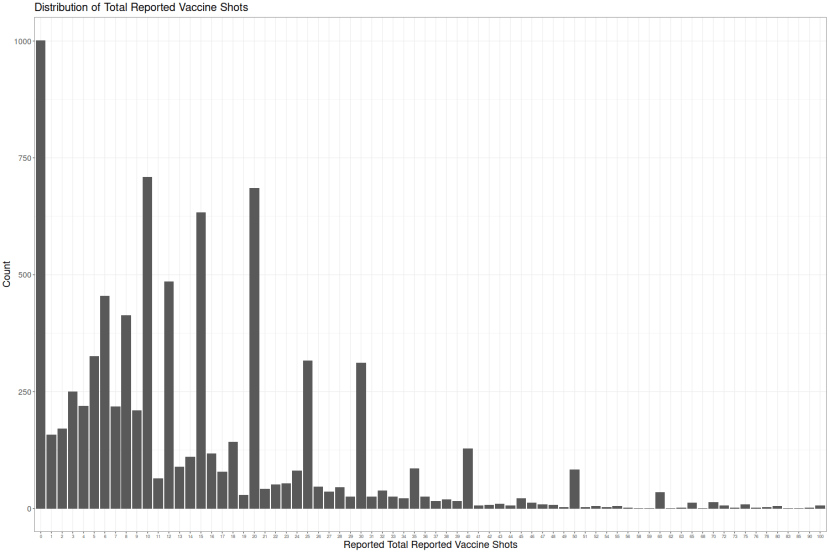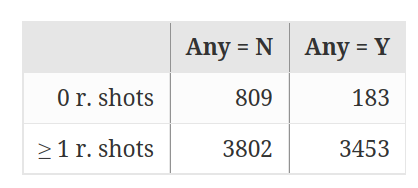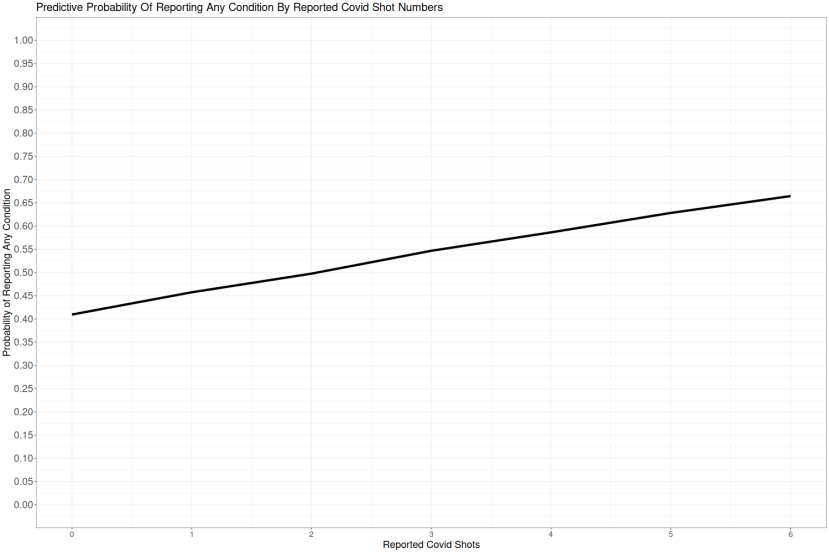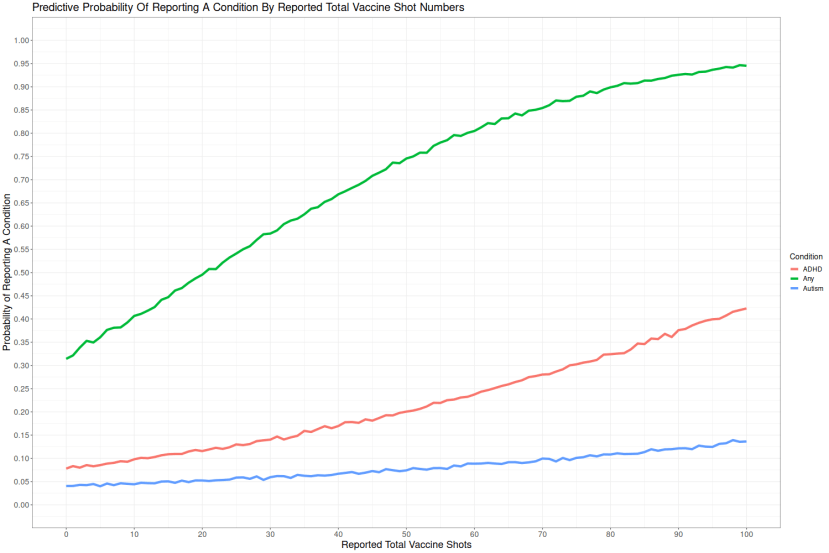Introduction
Steve Kirsch ran a survey asking parents to say about their kids how many vaccinations of all kinds they had, including separately covid, and whether these kids had any of several afflictions, such as ADHD, autism, and allergies. He asked me to look at the survey, which I did. I received no form of consideration for this from anybody. (I rely on the kindness of followers.)
Before we get to that, a word about academic Experts. For at least a century, since science became a profession, academics have reacted to intelligent criticisms of cherished theories in the same way as apes when deprived of bananas. Just ask Ignaz Semmelweis. They reach into their diapers and fling feces with furious force, while screaming they are in excruciating pain. Their hertrionics and hersterical ravening make Dr Smith sound like Wittgenstein at his subtlest.
Which is why it is such great fun to tease them.
It is forbidden, among academic Experts, to even suggest that vaccines cause autism. And after the covid panic, it is not allowed to say vaccines cause harm of any kind, even though vaccines cause harm by design and on purpose. Academic Experts as a class (which is not all academics), therefore, are willing to lie to preserve their status and prerogatives.
Do vaccines, and in particular does the covid vax, cause autism? I don’t know. The subject is large and tricky, and there is no way we can answer all questions, most of which are of great complexity, in one article. We can, however, look at Kirsch’s survey and see what it says and if it’s helpful.
Surveys
First, there is no such thing as a “scientific survey”. All surveys ask groups of people questions. If the survey queried all relevant people (like in a vote), then the answers the people give say all you can know about those questions, and only those questions, about that entire relevant group.
Surveys cannot say whether people are lying, exaggerating, forgetting, misinterpreting, tricking, or anything else, though we might be able to guess, with uncertainty, some of these things. “Randomness” is meaningless in survey design: random only means unknown.
If a survey only samples some of a relevant group, and its summary (or model of its summary) is an accurate assessment of those who answered (how could it not be!). But it can also be taken as a prediction of those not sampled. That is, a prediction of the type of people who were driven to answer surveys of this type. Other types of people than those who took the survey might exist, and the prediction of what these different people would answer might therefore be poor, or irrelevant.
Kirsch’s survey did not query all relevant people, and he meant to take its summary—which is an accurate assessment of those who answered—as a prediction of those who did not take the survey. What that means in his case, I say later.
What I Did
Here are the details of the data and my manipulations of it. Dull, but necessary. Skip to the next section if you don’t care.
I downloaded a snapshot of the data on Saturday afternoon. I don’t know if it changed after. It’s a standard simple spreadsheet: I put the field names in quotes. There are 8,300 people in my version.
I first transformed “# covid shots” into 1 through 6, and ignored the “+” in “6+”. I do see many reports of people with lots of shots, so this data looks believable, but I of course do not know this. Here’s the table:
This aligns with practical experience: for 6 shots, 42/8300 = 0.5%, which isn’t nuts.
I deleted all rows in which people reported more than 100 “Total # vaccine shots” (this is shots of all kinds, not just covid). This was 9 data points, all obviously absurd (but there is some uncertainty!). One person reported 1,500,000 total shots, for instance. I’m unsure what the real distribution in shots is, so I can’t judge whether, say, 50 shots is too high or average. But we can look at the reported distribution.
I had 1,0001 with zero reported total all vaccine shots; the rest had one or more. Here is the distribution of reported total vaccine shots.
I used “50” as the top total to consider below, but only because of the bump; which, of course, might only reveal the standard five-finger memory bias. If this survey only attracted anti-vaxxers, then it’s odd the people reporting 0 total shots would also report any condition. Like this:
About 18% of parents who reported 0 total shots also reported any condition; whereas about 48% of those who reported at least one shot reported any condition. For autism the rates were 2.3% (0 r.shots) and 5.3% (≥ 1 r. shots). For ADHD, these are 2.1% (0 r. shots) and 12% (≥ 1 r. shots). This is in favor of the participants not (wholesale) lying.
So is the percent of reported deaths. About 1.5% of parents reported the child was no longer alive (i.e. dead) also reported 0 total shots. And 0.8% of of parents reported the child was dead about also reported 1 or more total shots. Which is in favor of vaccines. For just covid shots, this was 1% (0 r. shots) and 0.6% (≥ 1 r. shots). Which is also in favor of vaccines.
I next looked at the field “Health conditions”. This contained all the listed maladies the parent said the child had.
If a person had ‘Child is alive AND perfectly healthy’ in this field, regardless of any other entry in that field, then I classed the kid as having NO conditions. Otherwise, if they had any other entry and did not have ‘Child is alive AND perfectly healthy’, then I classed them as Yes (Y) to having “Any” condition; i.e. they had at least 1 reported condition, of whatever nature.
I did the same separately for ADHD and Autism reported in that field, classing them as Y or N if they had these entries in that field, but did not have ‘Child is alive AND perfectly healthy’.
There were other fields, like reported child’s “Age today”, “Gender”, “Race”, whether the kid was reported “Alive” (there were only 75 reports of death), “Vaccine list”, details about the mother and whatnot. I did not consider any of these at this time.
I did two analyses. P-values and hypothesis tests should die, and should never be used under any circumstance. I have written about this extensively and will not bore you with these details here. But if you want, I can bore you in this talk I gave at Hillsdale, about half way
through (confusing causation with correlation):
(Why haven’t you watched this yet? Do I have to call your mothers?)
I did simple logistic regressions of either total number of covid shots, or total vaccine shots, and Any condition, then ADHD, then Autism, but the latter two only for total vaccine shots (of any kind).
I think the analysis of reported ADHD and Autism would be wrong for reported covid shots at this time. Supposing covid shots do indeed cause austism or ADHD, it is far too early after the shots, most of which only happened in the last 12 to 18 or 24 months, which is scarcely long enough after to get a useful diagnosis of either condition. These things take time. (But, for fun, I did do it; ADHD looks as below, and there is no signal for autism; i.e. a flat line.)
I used a predictive analysis (technically, what you see below is the predictive posterior distribution using default priors and fitted with stan_glm with four chains of 10,000 iterations each; convergence was reached, as will be obvious). No hypothesis tests! What you see below is the modeled probability of reported Any = Y (or ADHD = Y, or Austim = Y) given the total number of reported shots, covid or all kinds.
Now all this is REPORTED shot numbers, and REPORTED conditions, which might even be actual shot numbers and actual conditions, but we cannot know. The model is therefore of reported shots predicting reported conditions in survey populations like this. For instance, it remains a real possibility that this survey attracted those parents with children who suffered conditions, more than it attracted those parents with children who had no conditions. It could have attracted an army of anti-vax liars. We cannot know. But if the people lied, they did so in a linear way (you’ll see), which doesn’t seem likely.
Meaning these are NOT models of covid/total vaccine shots and (say) Austim. These are models of REPORTED covid/total vaccine shots and REPORTED Austim in people of the sort who answered this survey. That distinction must be remembered. (This applies to all surveys, not just this one!)
I haven’t done any other quality control, other than what I’ve mentioned here.
Results
First covid shots, then total all vaccine shots (which I do not think include covid numbers).
You can see the probability of reporting Any condition increases from about 40% with reporting no covid shots, to about 65% for reporting 6 covid shots. That 40% with reporting zero covid shows makes some sense, because kids can have, say, allergies (or whatever) even with no covid vaccine shots.
The result is plausible if we consider it points in the direction of actual numbers of maladies and actual numbers of covid shots. To repeat myself, all vaccines cause harm. On purpose. By design. That’s how they work, by causing harm! To develop some kind of noticeable reaction with vaccination is not usual, and that’s what we may be seeing here. (But we do not forget this is reported numbers, which only might be actual ones.)
Next is reported total vaccine shots and reported conditions.
Here the signal is clear, and obvious. More reported shots, the greater the chance the parent reported any kind of malady, or reported ADHD, or reported autism.
Autism is reported about 4% of the time in kids with no reported shots, and is reported about double that rate for kids with 50 reported shots. (I keep saying “reported”, but watch and see if this post gets any criticism, which will instantly forget this modifier.)
There is no special reason to use the 50, other than that bump (seen above). Perhaps 30 is a better number, given 92% of the reported totals are 30 or fewer. You can work out whatever examples you like from the picture.
As you can plainly see, the signal is similar for the reported Any condition and ADHD.
Just Answer The Question, Briggs!
I can’t answer the question, because I don’t know the answer. Vaccines might cause autism, they might not. We can never know cause from these kinds of statistical models. What we can say is that this data is in the direction of the possibility. It is not against the idea. The idea therefore should be taken seriously and not screeched at as unworthy.
There are, though, alternate explanations which also must be considered.
Quoting myself from above (for those who skipped): it remains a real possibility that this survey attracted those parents with children who suffered conditions, more than it attracted those parents with children who had no conditions. If this is so, then this data will show elevated, and maybe even exaggerated or fictional, rates of maladies above actual rates. How exaggerated and how fictional we cannot say.
Another possibility, and a stronger one, is that the more shots a kid gets, the more he sees a doctor, and the more he sees a doctor, the higher the chance he is “diagnosed” with something, anything. It is now almost impossible for a doctor not to find something not quite to their liking, given our descent into scientisim and over-measurement.
This objection is especially likely, I think, for maladies that are “popular” and in which mothers insist their kids are checked for. The false idea that we cannot be sure we are healthy unless certified by an Expert, only after much probing and prodding, is endemic. How can you, Mr Non-Doctor Reader, say you’re healthy? Where did you get your medical degree!
This is one of the criticisms I advanced when we first looked at vaccines and autism in 2015 and 2014. The more autism is in the news, the more mothers drag junior to the Expert to have him checked. And doctors are obliging in this way. Ask your doctor if this diagnosis is right for you.
I did not in 2015 think the signal of vaccines and autism was clear. It is still not clear, at least in data like this. But we haven’t seen, in this data, anything that dismisses it. Of course, everything said about autism goes for ADHD, but perhaps more so given how many boys are drugged to keep them tame.
Prediction: This post will make everybody confirm that their preconceived (i.e. thought of before you read this post) conclusion is the right one.
Subscribe or donate to support this site and its wholly independent host using credit card click here. Or use the paid subscription here. Cash App: $WilliamMBriggs. For Zelle, use my email: matt@wmbriggs.com, and please include yours so I know who to thank.









The frustration for me is the utter lack of interest in the medical community in exploring the possibility that vaccines (including COVID) cause harm or autism or ADHD. It’s like the science is “settled” or something...
I'm a humble and proud supporter of this here author and professor Wm. M. Briggs.
I thank you for this analysis.
I want to point out that autism has no scientific definition, as far as I know. It is a clinical opinion of a psychiatrist. There is no "objective" test at all.
Professor Briggs, isn't that a huge problem or is just my wild imagination?
I mean, there are a lot of people who suffer some obvious form of brain damage. No one has described what the damage is, exactly or as exactly as natural sciences allows, and no one know what causes it, what is the mechanism or anything.
There are believable claims of recovery, even full recovery, following what used to be called "alternative" medicine. But officially, as it always happen, if a person does something unorthodox and unauthorized by the commies, then the patient never had autism and it was a misdiagnosis. Same happens with cancer, sclerosis, lupus, Lyme disease, AIDS, etc.
Official diseases cannot be officially cured, at all, ever, no matter what.